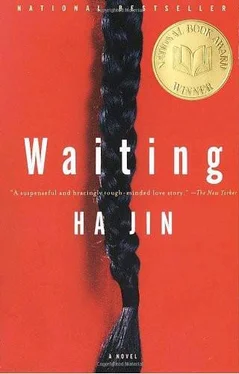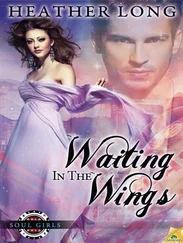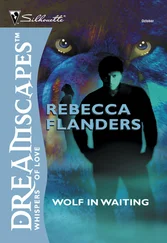With amazement she looked at his animated face.
He realized he had gotten carried away by his enthusiasm and added, "Of course it was written last century when American capitalism was still developing. In fact the optimism in the poetry reflects the confidence and progress of the time. Nowadays no American poet can write like this. They have all degenerated in the rotten capitalist society, without the rising spirit anymore."
She was impressed by his knowledge and eloquence, although she didn't understand his view completely. "I'll go to the City Library and see if I can find a copy," she said.
"No, they may not have it. I got this copy twenty years ago, from the translator himself. He was my teacher at Nankai University when I was a student."
"You studied English?"
"No, I majored in philosophy and minored in Chinese literature. My teacher knew English well because he had been educated in a missionary school. He was a well-read man, a true scholar, but he died of pneumonia in i957. Perhaps it was good for him to die young. With his problematic family background, he could hardly have escaped becoming a target for political movements." The commissar's face turned grave and he kept his head low, as though recollecting something.
"So this is a rare book? " Manna said a moment later.
"Not exactly. " His face turned vivacious again. "In some university libraries you probably can find a copy, but it has been out of print since the early fifties."
"I see."
"How about this? I'll lend you the book for a month. After you read it, you tell me what you think of it. Would you like to do that?"
"Sure, I'll be glad to read it."
She took the book from him. Though she agreed, a shade of doubt came over her mind because she was uncertain whether she could understand the poems, not to mention report to him her appreciation of them. She might make a fool of herself.
As she was putting the book into her satchel, the orderly stepped in and announced, "The car is ready, sir."
"Would you like to go to the movies with us, Comrade Manna Wu?" asked the commissar.
Hesitating for a moment, she said, "Yes, I'll be happy to if I haven't seen it."
"Have you seen The Flower Girl?"
"No."
"Neither have I. It was made by North Korea. Come along with us, I've heard it's very good."
Together they went out. At the front entrance to the hotel, a young officer was waiting for them beside a cream-colored Volga sedan. Commissar Wei introduced him to Manna. "This is Comrade Geng Yang, from the Third Border Division."
"Very glad to meet you. I'm Manna Wu." She held out her hand.
As they were shaking hands, she almost cried out — the officer's hand was so powerful that it felt like a vise gripping her fingers, though he apparently didn't notice her wince. He was a stern-faced man, not very tall but of heavy build. He held his body straight, a dark-reddish belt cinching up his jacket. At his flank he wore a i959 pistol, which was much smaller than those earlier Russian models. Seven squat bullets were sheathed on the flap of his holster.
They all got into the car, including the orderly. The movie was to be shown in the Workers' Cultural Palace, which was just a mile away.
The theater was almost full. As they were walking to their seats, Manna noticed several of her colleagues sitting among the audience and turning their eyes toward her. Haiyan was there, talking in different directions. At the sight of Manna, she stood up and signaled that she should join her. Manna waved back and shook her head, reddening a little.
Before they reached their seats, a fat official in a blue Mao suit appeared and stretched out both hands to the commissar, saying in a booming voice, "How are you, Old Wei? How I miss you!"
Commissar Wei looked startled, then smiled. "I'm well. How about you, Old Zhao?" he said delightedly.
"Fine, fine," the man said.
"Please join us."
The two men were still holding each other's hands while walking toward Row 14, talking about the condition of the municipal Party secretary, who had just broken his leg on a fishing trip. Manna recognized the official, who was a vice-major of Muji City.
They all took their seats. On her right sat the commissar and the vice-mayor; on her left were seated Geng Yang and the orderly. A few minutes later the lights went off and the movie started. Commissar Wei dropped his half-smoked cigarette on the terrazzo floor and stamped it out.
The movie told a sad story about a poor Korean family. Strange to say, it had almost no plot. A little girl was eager to have a fresh chestnut, so she went under a large tree, on which two boys, whose father was the richest landowner in the village, were plucking nuts and throwing them down at the children in rags. One of the brothers aimed at the poor girl and hit her with a thorny nut, which injured her eyeball. Then her elder sister had to sell flowers on the streets to support the blind girl and the family. The sisters went on weeping from the beginning of the movie until the very end. Their tears had a tremendous impact on the audience. As the girls cried on screen, many people in the theater could not hold back their tears.
Manna heard people sobbing and sniveling around her. Their weeping was so contagious that soon almost everybody in the theater began to mist up. Manna couldn't keep her tears back, but she didn't raise her hand to wipe them, just letting them trickle down her face. On her right, Commissar Wei dabbed his eyes again and again with a handkerchief, while the vice-mayor lowered his head sobbing and at times gasping for breath. Commissar Wei squeezed her hand and whispered, "I'm really sorry about this."
"It's a good movie," she said earnestly.
Then she noticed that Geng Yang on her left didn't show any emotion. Unlike others, he was sitting stock-still, making no noise at all. Doesn't he feel sad? she wondered. Time and again, out of the corner of her eye she glimpsed his stony face, which looked distant and detached. He seemed aware of her observation and exhaled a sigh, which betrayed more impatience than sadness.
At long last the movie was over and all lights came on. Many people had red eyes, but nobody looked ashamed. Some were still wiping their faces and blowing their noses with grimy handkerchiefs or scraps of newspaper. "Comrade Manna Wu," the commissar said in a miserable voice, "I didn't know it was such a sad picture. Otherwise I wouldn't have invited you."
"It was good and I was very touched."
"I have to stay with Old Zhao for a while. Do you mind if I let Comrade Geng Yang take you back to the hospital?"
"No, not at all."
"Please write to me and tell me what you think of Leaves of Grass, will you?"
"Yes, I will. "
Commissar Wei shook her hand and said good-bye. He gave instructions to Geng Yang, then moved away to join the vice-mayor.
The Volga was waiting for them in front of the building. They got into the car, which started heading north toward the hospital. Because the night had grown quiet, Manna noticed how little noise the car made. Only a small whirring sound could be heard as they drove along the asphalt road partly sheltered by sycamore leaves. The chauffeur had also seen the movie just now, and he was so affected by it that he began talking to the two passengers. "What a sad picture!" he said.
Manna entered into conversation with him, but meanwhile Geng Yang, seated in the front, didn't say a word. She was curious and wondered why he was so cold. "Geng Yang, what did you think of the movie?" she asked.
"It was all right."
"So you were not moved by it?"
"Actually not."
"Why not? Everybody was crying in the theater. Why were you so calm?"
"I don't cry. I've seen things more terrible than that."
Читать дальше











